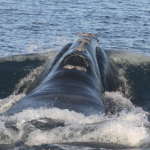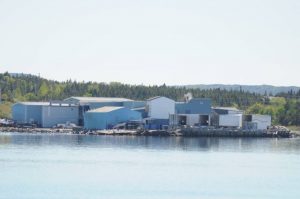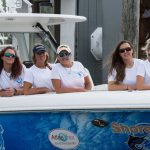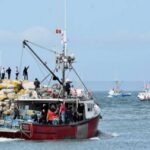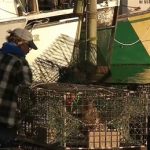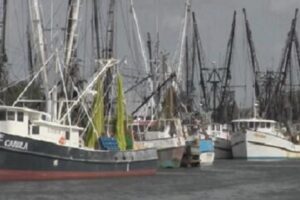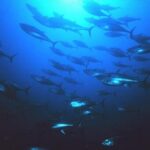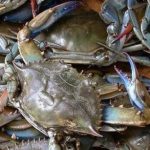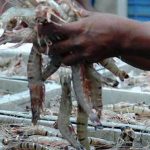Tag Archives: Lobstering
Commercial Fisherman Carl D. Schwab, of Port Clyde, Maine, has passed away
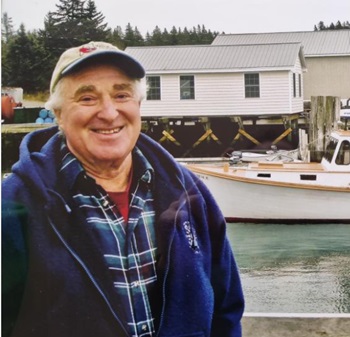 Carl D. Schwab, 89, died peacefully, Tuesday, April 16, 2024, at the Sussman Hospice House following a brief period of declining health and a lengthy fight with Alzheimer’s disease. He spent his last days surrounded by the love of his family. Born in New York City, November 10, 1934, Carl was the son of Irving and Bessie Schechter Schwab. A few mentors and friends in particular helped set him on his path as a man of the sea, not the city: Levi Hupper, Bertie Simmons, Stanley Stone, and Alfred Stanley. He spent most of his working life as a commercial fisherman on many boats, of many types, including dragging, seining, and lobstering. Carl is one of the founding members of the Port Clyde Fisherman’s Co-op, where he has served as president, vice president, and as a member of the board of directors for many years. more, >>CLICK TO READ<< 17:36
Carl D. Schwab, 89, died peacefully, Tuesday, April 16, 2024, at the Sussman Hospice House following a brief period of declining health and a lengthy fight with Alzheimer’s disease. He spent his last days surrounded by the love of his family. Born in New York City, November 10, 1934, Carl was the son of Irving and Bessie Schechter Schwab. A few mentors and friends in particular helped set him on his path as a man of the sea, not the city: Levi Hupper, Bertie Simmons, Stanley Stone, and Alfred Stanley. He spent most of his working life as a commercial fisherman on many boats, of many types, including dragging, seining, and lobstering. Carl is one of the founding members of the Port Clyde Fisherman’s Co-op, where he has served as president, vice president, and as a member of the board of directors for many years. more, >>CLICK TO READ<< 17:36
Feds announce areas where offshore wind can go in Gulf of Maine
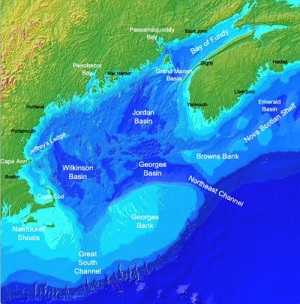 Federal regulators have made a final designation of roughly 2 million acres in the Gulf of Maine where offshore wind turbines can be deployed to help provide power to New England. The boundary set by the Bureau of Ocean Energy Management does not include any part of the federal lobster management area 1. That fishing area extends from state waters about three miles offshore to about 40 miles. The closest the designated federal wind energy area comes to Maine’s coast is just outside the fishing zone. The Maine Lobstermen’s Association said Friday that it appreciates that the fishing zone is excluded from the wind area approved by BOEM. But it said that it remains “steadfast” in its position that industrial wind power development does not belong anywhere in the Gulf of Maine. more, >>click to read<< 12:39
Federal regulators have made a final designation of roughly 2 million acres in the Gulf of Maine where offshore wind turbines can be deployed to help provide power to New England. The boundary set by the Bureau of Ocean Energy Management does not include any part of the federal lobster management area 1. That fishing area extends from state waters about three miles offshore to about 40 miles. The closest the designated federal wind energy area comes to Maine’s coast is just outside the fishing zone. The Maine Lobstermen’s Association said Friday that it appreciates that the fishing zone is excluded from the wind area approved by BOEM. But it said that it remains “steadfast” in its position that industrial wind power development does not belong anywhere in the Gulf of Maine. more, >>click to read<< 12:39
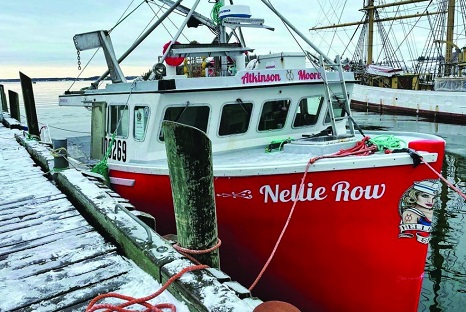
Setting Her Own Course – Lobstering with Lunenburg Harvester Gail Atkinson
Gail Atkinson is one of Canada’s very few female lobster harvesters, who employs an almost entirely female crew aboard the Nellie Row. Gail Atkinson grew up on Cape Sable Island in Southwest Nova Scotia. Coming from a long line of fish harvesters and boat builders, she originally had no desire to follow in her family’s footsteps. “I ended up starting fishing with my father,” said Atkinson. “I started when I was a little bit older because I couldn’t wait to get out of there. But, something happened, and I just ended up back there and I ended up going for a trip fishing, and I just fell in love with it. The rest was history.” Atkinson spent almost 20 years fishing with her father before she went off on her own to run an enterprise. Photos, >click to read< 13:39
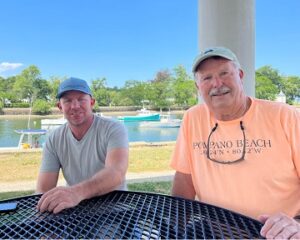
A day in the life of a Cohasset lobsterman
Cohasset lobsterman Adam Donovan grew up in town and got his start with Matt Marr, who retired from lobstering in 2019 after 47 years on the ocean. Growing up, Donovan’s family was close friends with the Marr family, so it came as no surprise when Marr asked Donovan to work for him on his boat during the summer of 2002. He accepted the invitation. “The best part about having Adam [onboard] was that he learned various skills after one try,” he recalled. Photos, >click to continue reading< 07:34

Whales, Warming and Offshore Wind Farms – Lobstering is under attack
As Rep. Billy Bob Faulkingham described it, three seemingly combined forces are aligned and have put the bull’s-eye on the men and women in Maine whose lives depend on lobstering, whales, warming and wind power. The right whale protection consortium has heightened its efforts to alter nearly every aspect of Maine’s primary fishing industry by pushing the federal fisheries agencies to limit, reduce and even eliminate the fishing methods currently employed in the local waters and the Gulf of Maine,,, At best, the supposed science is leaning toward saving whales, with little regard for the men and women who are active conservationists every day while doing their jobs. The warming water folks, often the same groups and agencies that are involved with the right whale restrictions, also want to promote bureaucratic rules that will severely impact all forms of fishing. >click to read< 11:06

Facing a declining lobster industry, whale rules, Blue Hill lobsterman has a Plan B
For a 48-year-old lobsterman, Jeremy Tyler considers himself lucky. Aside from shoulder pain and arm numbness that awakens him five or six times a night, the beefy captain and owner of the All-In,,, “I’ve done progressively worse these last three years,” Tyler said. “I was there for the first thousand-pound day in the Blue Hill area. So he and his wife, Megan Tyler, are starting a new business in the first floor of a former floral shop off Route 172 that will combine his lobstering with her experience at restaurants. >click to read< 07:49
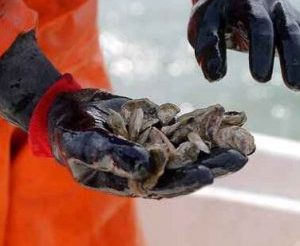
Aquaculture, lobstering tussle headed to Maine statehouse
Democratic state Sen. David Miramant, of Camden, is proposing a bill that would make approval criteria for new aquaculture leases stricter. Miramant’s bill would require new lease applicants to demonstrate that no practical alternative exists that would have less of an impact on existing uses. The proposal would also reduce the maximum lease acreage a person can hold from 1,000 acres to 50 acres. The proposal comes as some lobstermen are sounding the alarm that the increase in fish and shellfish farming in Maine’s waters could limit their ability to lay traps. >click to read< 13:04

Whale conservationist tackles fishing industry
A whale conservationist with a radical style says he intends to move forward with a “whale safety” initiative petition for 2020 in Massachusetts to ban vertical buoy ropes used in commercial fishing, among other efforts to protect whales and sea turtles. “We have to have a paradigm shift,” Richard Maximus Strahan, of Peterborough, New Hampshire, said of his advocacy efforts to stop the death and injury of whales and sea turtles from entanglement in rope used in commercial lobstering, crabbing and gillnetting. >click to read<19:29
First half of Maine’s lobstering season ‘painfully slow’ for fishermen
 A cold spring, high bait prices and a stormy summer are adding up to a slow lobstering season in Maine. Every fisherman and every lobstering port along Maine’s 3,500-mile coastline is different. But as of Oct. 1, the midpoint in the industry’s peak season, most Maine lobstermen and the dealers who buy from them agree the catch is down. They disagree on whether the industry will be able to land enough lobster to recover and keep up with the last few years of record harvests. click here to read the story 07:46
A cold spring, high bait prices and a stormy summer are adding up to a slow lobstering season in Maine. Every fisherman and every lobstering port along Maine’s 3,500-mile coastline is different. But as of Oct. 1, the midpoint in the industry’s peak season, most Maine lobstermen and the dealers who buy from them agree the catch is down. They disagree on whether the industry will be able to land enough lobster to recover and keep up with the last few years of record harvests. click here to read the story 07:46
No new rules for declining southern New England lobstering
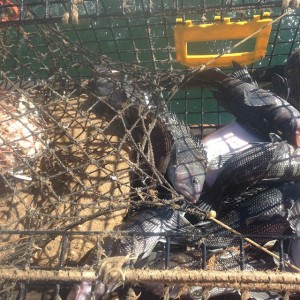 An interstate panel that manages fisheries voted on Tuesday against a plan to try to preserve the declining southern New England lobster population with new fishing restrictions.The New England lobster fishery is based largely in Maine, where the catch has soared to new heights in recent years. But the population has collapsed off Connecticut, Rhode Island, southern Massachusetts and New York’s Long Island as waters have warmed in those areas. An arm of the Atlantic States Marine Fisheries Commission considered a host of new restrictions about lobster fishing in southern New England on Tuesday and chose to shoot the plan down.,, “It’s time to think a little differently about how we are managing lobsters in southern New England,” board member Peter Burns said. “We know there are things we can do,” (it was a lively discussion!) click here to read the story 18:38
An interstate panel that manages fisheries voted on Tuesday against a plan to try to preserve the declining southern New England lobster population with new fishing restrictions.The New England lobster fishery is based largely in Maine, where the catch has soared to new heights in recent years. But the population has collapsed off Connecticut, Rhode Island, southern Massachusetts and New York’s Long Island as waters have warmed in those areas. An arm of the Atlantic States Marine Fisheries Commission considered a host of new restrictions about lobster fishing in southern New England on Tuesday and chose to shoot the plan down.,, “It’s time to think a little differently about how we are managing lobsters in southern New England,” board member Peter Burns said. “We know there are things we can do,” (it was a lively discussion!) click here to read the story 18:38
Lobstering off the shores of Delmarva – A photo article
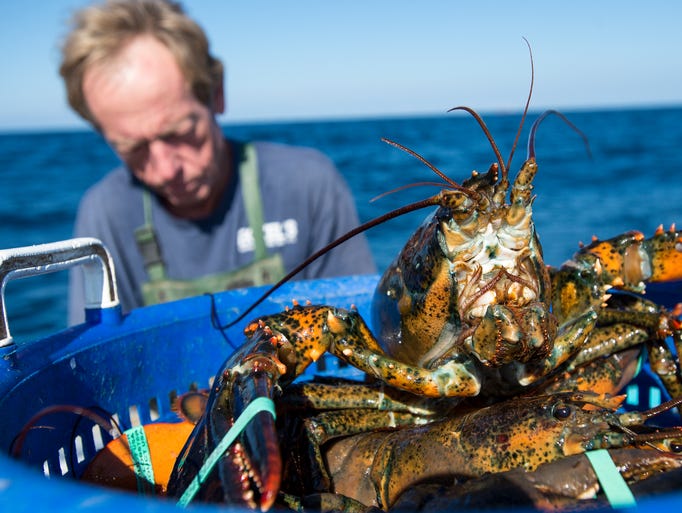 Lobsters are banded and piled into a basket by waterman Sonny Layton aboard the 42 foot commercial fishing boat Andrew G, owned by Chet Townsend. Crab claws and lobsters are harvested, but the main income for Townsend is from sea bass. See the rest here 10:59
Lobsters are banded and piled into a basket by waterman Sonny Layton aboard the 42 foot commercial fishing boat Andrew G, owned by Chet Townsend. Crab claws and lobsters are harvested, but the main income for Townsend is from sea bass. See the rest here 10:59


































